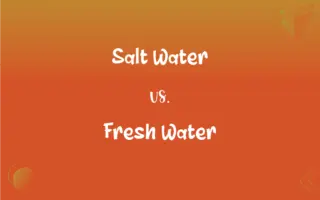Supplements vs. Vitamins: What's the Difference?
Edited by Aimie Carlson || By Harlon Moss || Published on December 8, 2023
Supplements are products taken to enhance the diet, which may include vitamins, minerals, and other nutrients. Vitamins are specific organic compounds vital for body functions, and a subset of supplements.

Key Differences
Dietary supplements encompass a broad range of products designed to augment the diet, which can include vitamins, minerals, amino acids, and herbs. Vitamins, a specific group within supplements, are essential organic compounds required in small quantities for various bodily functions.
Supplements are used to ensure adequate intake of essential nutrients, improve health, or target specific dietary needs. Vitamins, such as Vitamin C or D, are necessary for health and help prevent various deficiencies and diseases.
Supplements can be derived from natural sources or synthesized in laboratories, and they often include more than just vitamins, like minerals and antioxidants. Vitamins are naturally occurring substances found in food, necessary for normal physiological functions.
The use of supplements can be tailored for individual health needs or specific conditions, sometimes containing a blend of various nutrients. Vitamins are categorized into fat-soluble (like Vitamins A, D, E, K) and water-soluble (like Vitamins B and C), each with distinct roles in the body.
Supplements, while beneficial, should be taken with caution to avoid excessive intake, especially when they contain active ingredients or high doses of vitamins. Vitamins, in their pure form, are essential for health, but excessive intake can also lead to toxicity or adverse effects.
ADVERTISEMENT
Comparison Chart
Definition
Products enhancing diet, including various nutrients
Specific organic compounds essential for body functions
Variety
Wide range, including vitamins, minerals, herbs
Specific types like Vitamin A, B, C, D, E, K
Source
Natural or synthetic
Naturally found in foods, can also be synthesized
Purpose
General health, specific dietary needs
Prevent deficiencies, essential for physiological functions
Usage Consideration
Can include a mix of nutrients, requires careful dosage
Essential in certain quantities, excess can be harmful
ADVERTISEMENT
Supplements and Vitamins Definitions
Supplements
Products taken to enhance dietary intake.
She takes fish oil supplements for omega-3 fatty acids.
Vitamins
Required in small quantities in the diet.
She gets her daily vitamins from fruits and vegetables.
Supplements
Beneficial for overall health and wellness.
Dietary supplements can complement a balanced diet.
Vitamins
Essential organic compounds for bodily functions.
Vitamin C is important for immune system health.
Supplements
May include vitamins, minerals, and other nutrients.
His daily supplements include a multivitamin and probiotics.
Vitamins
Naturally found in various foods.
Leafy greens are a great source of Vitamins A and K.
Supplements
Can be natural or synthetic.
He prefers supplements made from natural sources.
Vitamins
Help prevent deficiencies and diseases.
Vitamin D supplements prevent deficiency in winter.
Supplements
Used to target specific health needs.
Calcium supplements are recommended for bone health.
Vitamins
Categorized into fat-soluble and water-soluble types.
Vitamin E, a fat-soluble vitamin, is good for skin health.
Supplements
Something added to complete a thing, make up for a deficiency, or extend or strengthen the whole.
Vitamins
Any of various fat-soluble or water-soluble organic substances that are essential in minute amounts for normal growth and activity of living organisms. They are synthesized by bacteria and plants and are obtained by animals chiefly in their diet.
Supplements
A section added to a book or document to give further information or to correct errors.
Vitamins
A preparation containing one or more vitamins, often taken as a dietary supplement.
Supplements
A separate section devoted to a special subject inserted into a periodical, such as a newspaper.
Vitamins
Plural of vitamin
Supplements
See dietary supplement.
Supplements
See supplementary angle.
Supplements
To provide or form a supplement to.
Supplements
Plural of supplement
Supplements
Infl of supplement
FAQs
What are vitamins?
Essential organic compounds necessary for health.
Can supplements replace a balanced diet?
No, they are meant to complement, not replace, a balanced diet.
How are vitamins obtained?
Through diet or supplementary products.
What are dietary supplements?
Products taken to enhance diet, including vitamins and minerals.
Why take supplements?
To ensure adequate nutrient intake and support health.
What’s the difference between fat-soluble and water-soluble vitamins?
Fat-soluble vitamins are stored in body fat, water-soluble are not.
Are supplements regulated?
Yes, but differently than pharmaceuticals.
Are all vitamins the same?
No, there are different types, each with specific roles.
Can vitamins cure diseases?
They can prevent deficiencies but not cure diseases.
Who needs dietary supplements?
People with nutrient deficiencies or specific health needs.
Do children need vitamins?
Yes, for growth and development.
What are the risks of taking supplements?
Excessive intake and interactions with medications.
What’s the role of vitamins in the body?
They support various bodily functions and prevent deficiencies.
How to choose the right supplements?
Based on individual health needs and doctor’s advice.
What are common vitamin deficiencies?
Vitamin D, B12, and iron are common.
Should pregnant women take supplements?
Yes, prenatal vitamins are recommended.
Can you overdose on supplements?
Yes, particularly with fat-soluble vitamins and minerals.
Are natural vitamins better than synthetic ones?
The efficacy is generally similar, but some prefer natural sources.
Can supplements improve athletic performance?
Some can aid in recovery and performance.
How to store vitamins and supplements?
In a cool, dry place away from sunlight.
About Author
Written by
Harlon MossHarlon is a seasoned quality moderator and accomplished content writer for Difference Wiki. An alumnus of the prestigious University of California, he earned his degree in Computer Science. Leveraging his academic background, Harlon brings a meticulous and informed perspective to his work, ensuring content accuracy and excellence.
Edited by
Aimie CarlsonAimie Carlson, holding a master's degree in English literature, is a fervent English language enthusiast. She lends her writing talents to Difference Wiki, a prominent website that specializes in comparisons, offering readers insightful analyses that both captivate and inform.







































































